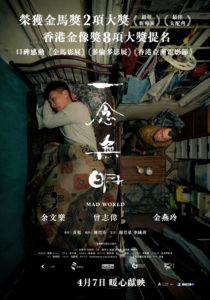Director: Wong Chung
Cast: Eric Tsang, Shawn Yue, Elaine Jin, Charmaine Fong, Yvan Chan Hok-Man, Ng Siu-Hin
Running Time: 101 min.
By Martin Sandison
The name Eric Tsang conjures up images of Golden Harvest comedies like My Lucky Stars (I’ll never forget the button mushroom joke) or his magnificent turn as gang boss Hon Sam in Infernal Affairs and it sequel. A seasoned veteran of Hong Kong cinema, even directing martial arts movies (he helmed two of the very best, The Loot and the Challenger), Mad World sees him tackle a very different character, and a very different style of movie. This heart-wrenching drama, which has experienced great success commercially and critically (it won best film at the Osaka Film Festival this year), pushes all the right buttons. It manages to shed light on the taboo subject of mental illness in a very human way, while maintaining a platform for superb performances by the two leads.
Tung (Shawn Yue), a stockbroker diagnosed with bipolar disorder, has been discharged from hospital and goes to stay with his estranged father (Eric Tsang), a truck driver who lives very frugally. The movie flashes back at times to Tung, looking after his mother (Elaine Jin), who was also bipolar; Additionally, Tung has to deal with the reconciliation with his ex-wife (Charmaine Fong). The main thrust of the narrative is the relationship between father and son, not to mention the challenges and stigmas they encounter along the way.
Mad World is the feature film debut of Wong Chung, who had directed a segment of the Tsang-produced Streets of Macau anthology. This film is an anomaly of a Hong Kong film; a very heavy drama that doesn’t rely on action or CGI, but the weight of its subject matter, as well as the three magnificent performances from Tsang, Yue and Jin. Everyone involved in making the film, especially Tsang, were worried about its production. For Tsang, to take on such a heavy project was risky business, and the same goes for Yu, who is known for his genre film roles.
Mad World’s script, which was written by Wong and Florence Chan, was what convinced all the actors to work on the film. They both researched the project meticulously, talking to families who had experienced bipolar disorder and even truck drivers. The screenplay is very lean screenplay with no superfluous scenes; it’s near-perfect for the subject matter. Both Wong and Chan are influenced by the Hong Kong new wave films, which addressed social issues and subverted genre in a game-changing way – Jacob Cheung’s 1992 Hong Kong film, Cageman, was also a reference point. The knowledge and reverence these two young talents have for the history and relevance of Hong Kong cinema shines when watching the film.
Tsang knew the movie would lend itself to critical appraisal and come award season, he has been proven right: Tsang ended up winning Best Supporting Actor at the Golden Horse and Hong Kong Film Awards, as did Elaine Jin. Yue has been nominated for numerous awards, and Wong Chun won a Golden Horse for Best Director and the award for Best New Director at the Hong Kong Film Awards.
What makes this film so successful is its approach; one that is so sensitive to the depiction of mental illness and poverty that you can’t come away and not be affected by it. Most people in their lives will experience mental illness, be it themselves, or family and friends. This movie stands tall and proclaims that these people need to be treated with care and respect, and not dismissed as merely “crazy.” Director Wong has indicated that in a culture, such as Hong Kong’s, which is so fast and at times impersonal the general public don’t take the time to understand this. Personally, I feel lucky to live in a society like the UK wherein the treatment and understanding of mental illness is recognised as important, and there are numerous charities that do unbelievable work for those who are vulnerable.
Some of the scenes between Tsang and Yue are so powerful that I was moved to tears. One of them, near the beginning of the film – with Tsang owning up to his weakness as a fathe – is incredibly emotionally honest. The character arc of both is magnificently drawn, with Tsang coming to understand bipolar disorder and experiencing both positivity and negativity from the people around him. Yue depicts the manic phases and extreme emotions of Tung brilliantly, as he so desperately wants to reintegrate in to society but is crippled by the illness. One scene shows him appearing at a friends wedding and very bravely making a speech wherein he talks about it, something that can empower sufferers to come forward. It’s the kind of scene that makes you remember the power of cinema.
While the low budget of the production hinders aspects of the film, such as style (Mad World was shot for $2 million HK dollars in 16 days), its depth of themes and characters means it will stay long in the hearts and minds of viewers. I, for one, am very glad Tsang decided to make the film, and kudos to the bravery of all the filmmakers, as they have captured modern societal problems in a truthful and beautifully sad way. Mad World will be released in the West soon, and I will watch it again.
Martin Sandison’s Rating: 9/10





Looks profoundly touching.
Reading your review has made me want to watch this movie. I have been almost moved to tears eating your review. It seems like a simple and wonderful story told in a beautiful way
Thank you so much Temitope! It is exactly as you described.
Do you want some fries with that? 😛
And you all thought I was crazy for using the words “creamy tasty treats”…